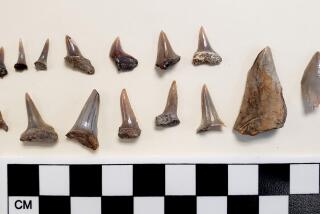Warming Trend Detected in Pacific
Southern California coastal waters have warmed in recent decades to their highest level in 1,400 years, according to a study of fossilized plankton published this week in the journal Science.
A group led by David Field of the Scripps Institution of Oceanography in La Jolla analyzed sediment cores drilled off the Santa Barbara coast. The cores contained thin layers of shells from microscopic plankton called foraminifera, or forams, that rained to the sea floor after the organisms died.
The cores showed that as ocean temperatures varied, the forams alternated between species that thrive in warmer waters and those that favor cooler waters. Field found that subtropical and tropical forams started to increase about 1925. The increase became more pronounced after the 1970s.
Part of the ocean warming was due to a cycle of climate variability called the Pacific Decadal Oscillation, which shifts about every 20 years. The most recent warm cycle lasted from 1977 to the mid-’90s.
But Field found that the amount of tropical and subtropical forams rose during that period to its highest point in 1,400 years, suggesting that the increase was not just a product of the Pacific Decadal Oscillation.
“There’s an additional warming ... that makes the 20th century atypical,” he said.
Experts estimate the decadal oscillation accounts for about a 1-degree variation in Southern California ocean temperatures. Over the last century, upper ocean temperatures here have warmed about 3 degrees.
One likely cause for the additional temperature rise is the human production of greenhouse gases, which are linked to ocean and atmospheric warming worldwide, Field said.
Bill Peterson, a scientist with the National Oceanic and Atmospheric Administration, agreed with Field’s conclusions of a long-term warming trend.
Peterson also said that, for unknown reasons, the Pacific Decadal Oscillation might be speeding up from alternating 20-year cycles to three- or four-year cycles.
“It’s not behaving like it used to behave,” Peterson said.






